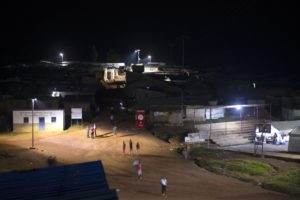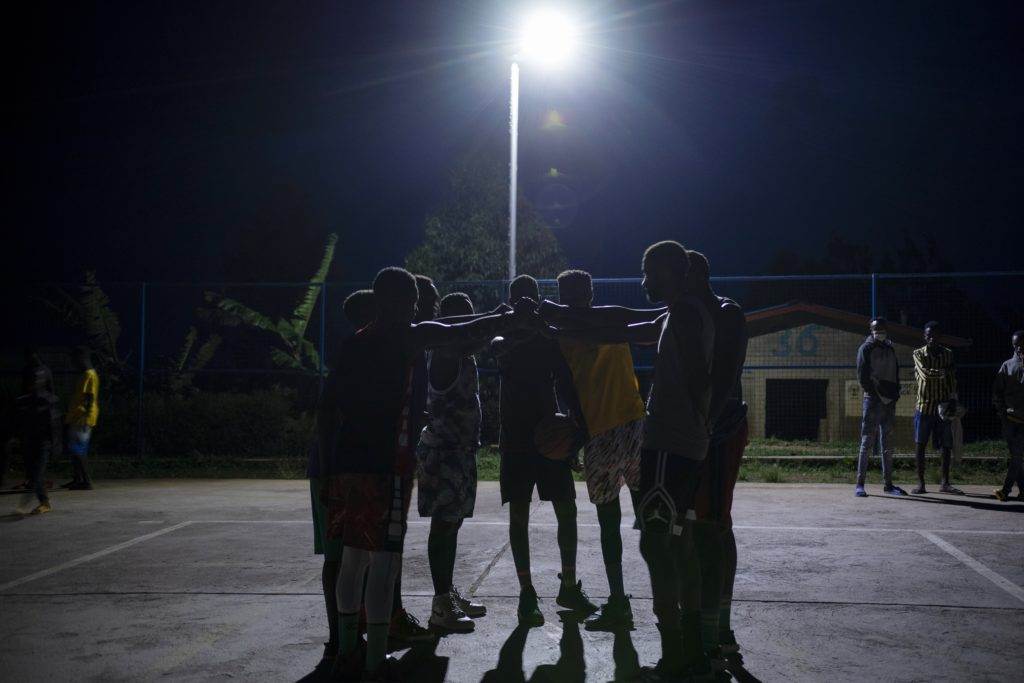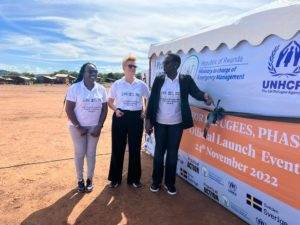Taking more lives off hold: Energy access for refugees in Rwanda to be scaled up
Thousands of refugees are set to work with Practical Action as it expands its energy work in camps and host communities in Rwanda over the next four years.
After helping to bring energy access to 83,000 people in Nyabiheke, Kigeme and Gihembe refugee camps, the work will continue and expand into three more – Mahama, Mugombwa and Kiziba. The project is set to reach more than 100,000 refugees and host communities, demonstrating the power of electricity in enabling people to take their lives off hold and turn camps into safer places to live with thriving economies.

“This is a unique piece of work, with the power to change the lives of millions of refugees around the world for the better. The first phase has proved to people that our approach can work, now we are going to showcase it at a bigger scale to prove it can be rolled out for refugees throughout the world. Refugee camps shouldn’t be places where innocent people, forced to move through no fault of their own, cannot have ambitions and must live in the dark. Instead, we will show that with the support of the host community, access to renewable energy, financial support, capacity building and awareness creation, it is possible for people to feel safe at night and reach their potential.”- Denyse Umubyeyi, Practical Action Country Director for Rwanda.
Renewable Energy for Refugees (RE4R II) will showcase how access to affordable, reliable, and sustainable energy can transform refugee camps and their surrounding communities into places where people can continue to be economically and socially active.
“Access to energy is not only life-changing, especially for women, it is also a prerequisite for people and businesses to grow. I salute the efforts of the Government of Rwanda to provide electricity to 100% of the population by 2024 and am pleased that Sweden can contribute to this ambition, as here, in refugee camps and host communities.” Swedish Ambassador Johanna Teague.
Practical Action will manage the project with funding provided by the Sida-Swedish International Development Cooperation Agency, working in close collaboration with Rwanda’s Ministry of Emergency Management, the United Nations High Commission for Refugees-UNHCR, the camp-and host community representatives and local authorities.

During the first months of 2023, Practical Action Rwanda will publish tenders for business cooperation within RE4R II for solar home systems, clean cooking and fuels.
“Renewable Energy for Refugees project will support the Government to achieve our commitments to the Global Refugee Compact, specifically the pledge on Energy and Infrastructure and contributing to achieving Sustainable Development Goal 7, which aims at ensuring access to affordable, reliable, sustainable and modern energy for all.” -Minister in charge of Emergency Management, Marie Solange Kayisire.
The project’s goal is to achieve the following outcomes:
- Refugee communities in all camps in Rwanda and the surrounding host communities have access to affordable, low-carbon and environmentally friendly energy for household, business and community uses;
- Refugees in all camps and the surrounding host communities benefit from improved quality of life and livelihoods through strengthened markets, increased economic activity and a focus on the transformative changes that improved access to energy offers;
- Humanitarian stakeholders in Rwanda and in the wider, global humanitarian sector prioritise renewable energy solutions, endorse, adopt and replicate Practical Action’s approach, and include refugee energy and livelihoods needs in their plans and policies at local, national and international levels.

The project is anticipated to reach more than 113 000 refugees and 34,000 host community households, whereby:
- 70% of households in five refugee camps and their host communities will have access to renewable energy products and services (minimum Tier 1);
- 300 (PUE- Productive use of energy) enterprises to have access to suitable energy products and services to meet their business requirements;
- 80% of the total area of refugee camps will be covered by public lighting, and
- 70% of households will have access to clean fuels and technology.
The previous phase achieved the following over the last five years:
- Enabled green energy access for more than 83,000 refugees in Rwanda who can now enjoy improved health, run their businesses, study, and socialise at night after investing in better access to clean energy.
- Private sector suppliers sold nearly 7,000 cookstoves and 1,254,887kg of biomass pellets. This enabled beneficiaries to save time on cooking, save money on fuel and protect them from health concerns. More here.
- Reduced the money spent on fuel for cooking by 23% and deforestation by reducing cooking with wood and charcoal by more than 50%
- Reduced time spent gathering fuel for cooking each week by 1.4 hours, allowing refugees to spend more time with their families or earn income.
- Installed 4,279 solar home systems, enabling children to study and small businesses to run at night.
- Installed 185 solar-powered streetlights. 91% of people interviewed said they felt safer using the camp at night.
- Increased business income by 50%
- Trained 150 refugees in the maintenance of solar technology.
- Created more than 1000 jobs.
Chantal Bibonimana, a retail shop owner and Congolese refugee, who saw the benefits of renewable energy in one closed camp before moving to Mahama said:
“Before the project, we had security issues. We wouldn’t move at night; we were struggling to take sick people to the hospital, because of the darkness. Our first issue was resolved when we got community streetlights. Our children also had problems with education. They weren’t doing well. When they were back from school, they couldn’t review their school notes because it was dark. The solar home systems changed that.”
Domitile Ningonsala, Chantal’s neighbour of the past five months and a Burundian refugee who hasn’t reaped the rewards of having electricity in her home, said:
“In 2020, when we arrived at the camp, we discovered that some of the neighbours had solar-powered homes while we had not. As a result, we leave our homes when it becomes dark to talk to our neighbours where there is light. I would be overjoyed to install a solar system in my home like my neighbours have so I don’t have to walk outside looking for electricity to charge my phones without disturbing them.
The change that energy can bring is immense. Having light would be so helpful. We wouldn’t have a limit on what we are working on. We would be able to work at our homes. We would be able to eat at night, with no need to use candles or phone torches that fade when one leaves the room leaving others in the dark. It is so hard to depend on only one light placed in one room.”
Turi Kumwe (we’re together) at the launch event in Mahama camp
With representatives from the Ministry in charge of Emergency Management (MINEMA), the Ministry of Infrastructure (MININFRA), the Ambassador of Sweden and her delegation, the United Nations Refugee Agency (UNHCR), the government and district officials, refugees, and host community members, the project was launch on November 24th. All joined at Mahama Camp to celebrate the beginning of great change for the 100,000 refugees the project will reach in this new phase.
“This project will support the Government to achieve our commitments to the Global Refugee Compact, specifically the pledge on Energy and Infrastructure, and contribute to achieving Sustainable Development Goal 7, which aims at ensuring access to affordable, reliable, sustainable and modern energy for all”, said the MINEMA ministry, Ms. Kayisire, at the launch event.

A crucial aspect highlighted in the speeches was ownership, emphasising the importance of working closely with the communities in embedding the knowledge on operating and maintaining the technologies and infrastructure beyond the project’s scope.
Johanna Teague, the Sweden Ambassador, pointed out during the event the importance of collaboration for the success of this project: “I am touched because it’s really about children being able to play outside of the dark, communities that jointly extend time or social interaction, for girls and boys, women, and men to feel safe. Secondly, business and livelihood opportunities are at the program’s core; 300 small businesses will receive training and support to afford access to electricity. (…) The third aspect is about working together. Practical Action has already shown us in the first phase what is possible to achieve and what is possible to deliver. But Practical Action as all of us is dependent on us working together”.
An aspect which is at the core of Practical Action’s vision. Akinyi Walender, our Africa Director, recognised and thanked the commitment from everyone present, from the refugees and host communities members to the government and donors, working towards a future with plenty of opportunities for everyone.
Learn more about the transformative work taking place in Rwanda, visiting the country profile, and about the RE4R project, clicking here.
Social Feed
Today in Mahama refugee camp we launch the Renewable Energy for Refugees phase II pic.twitter.com/pgguJEFBcn
— Sweden in Rwanda (@SwedeninRW) November 24, 2022
In the launch of Renewable Energy for Refugees Project II, Min.@mskayisire commended Sweden for support provided in country's development journey & refugee response interventions in general & particularly for contributing to #GoR commitment to ensure sustainable energy for all. pic.twitter.com/pldBYsAjNj
— Ministry in charge of Emergency Management (@RwandaEmergency) November 24, 2022
It was an amazing day with inspiring testimonies!
— Practical Action Rwanda (@PA_Rwanda) November 24, 2022
Your excellency @SweAmbRwanda, we are grateful for this collaboration with Sida that will lead to transformative change in energy.#RE4RII
Turi kumwe#renewableenergy #forrefugees & #hostcommunities @AWalender @DenyseUmubyeyi https://t.co/qIrmZpapLl